
The world is opening up and confidence in travel is returning. Perhaps you too are in the process of planning your holiday with your little ones? Many families then worry that a lack of routines and time zone differences could throw their little ones off. While some children tend to cope easily with change, others are less adaptable. Our UK sleep specialist Gemma Coe is a mum of two herself and as a certified baby and child sleep consultant. She helps families all over the world develop healthy sleep habits. Today, Gemma tells us what to look out for when it comes to children's sleep when travelling.
Child sleep on holiday
"First of all, I want to say to you: don't worry too much. You are on holiday. It's a short time when your number one priority should be FUN. If you throw out all your routines and schedules during your travels and develop other methods to get your kids to sleep, that's okay - and anything but a problem. If your kids usually have a stable routine at home, you'll be back on track within two to three days after your trip.
Flying with children - how to make the most of sleep
If you are planning a long-haul trip, I would suggest planning a night flight if possible. Your children will get the longest sleep and you will have the most relaxed time. A few days before the holiday, talk to your children about how you will all sleep on the plane. If they are old enough to understand the concept of a holiday, let them know that it will feel a bit funny at first, but on the plane many people will close their eyes and be quiet as mice.
Dinner at the airport can be quite exciting, but get your little ones into their pyjamas before they get on the plane and take time to do a little sleep-in routine on board! Pack their comforters, sleeping bags and anything else that offers familiarity. Sure, sleep won't be perfect and may even be late, but it will come eventually and eat up some of the many hours of flying. The gentle movement of the plane and the natural white noise can help. If you have small children, check the possibility of a bassinet or having a reclining seat on board and book it well in advance with the airline. If you arrive tired at your destination, take a nap together on the day of arrival and go to bed early.
Sleeping and time difference - how do you find a rhythm on the ground?
Most of the families I deal with want to know how best to accommodate their child in a foreign place and how to manage to adjust to the new time zone all together. I have the following tips for that:
Create a place like home: Whether you are staying with friends, in self-catering accommodation or in a hotel, there are always a few things you can do to make it as comfortable as home. The best way to do this is to use white noise on a mobile phone or iPad, take their comforter, sleeping bag and even your child's mattress cover or duvet. It should have been used for a few days so it smells like your own bed. During your trip, a pre-nap relaxation and sleep routine becomes even more important. It helps you wind down after an exciting day and encourages you to fall asleep.
Take advantage of the time difference: Depending on your time difference, find out which routine works best for you. For example, a few months ago we were in Greece. There it was two hours earlier than in London. We managed to keep the kids on British time the whole time. This allowed us to sleep in and have some cosy longer evenings with entertainment. If you can, keep your kids in their original time zone or only adjust them halfway to the new time zone. This will also make it easier for you when you return home.
Use daylight: If you are a little further away, adjust to daylight as much as possible. It is a powerful stimulus for your body clock. If you are flying east, use the light to wake your children naturally in the morning. It is best to leave the curtains open. If you're flying west, use blackout blinds (there are also travel blinds) to block out the light and slumber a little longer. Hotels usually have great blackout curtains. You will probably extend your children's waking time to adjust to the new time zone, but keep an eye on signs of tiredness and let them go to bed earlier if needed. If your children are really struggling to stay awake, offer them a 10-15 minute nap to help them get through to bedtime without getting overtired. A short walk in the pushchair or carrier can help you with this!
Adjust to the new time: If you know your children won't be tired for the first few days at the new bedtime, it's best to plan some activities in the afternoon to tire them out. You can also all get up early together and go exploring or swimming before everyone else is at the pool. It usually takes about a day for the body to adjust to each hour of time difference. It may take a few days to adjust to the new time zone. It tends to be easier to fly east to west, as it's easier to stretch out a day (possibly with an extra power nap for the little ones) than to cut one short and go to bed before you're tired. But honestly, just have fun. And if sleeping doesn’t go to plan, a nap on the way in the pushchair is better than no sleep at all. Stay relaxed and try to enjoy your holiday as much as possible.

The return home: The important thing is to be as consistent as possible with your usual routines when you get home. Grab an extra cup of coffee for an extra early start to the day, and push your schedule back a little more into normal every day. You can do it! Now have a great time travelling with your kids ... "
For more great sleep information and advice make sure you’re following Gemma’s blog and Instagram.



















